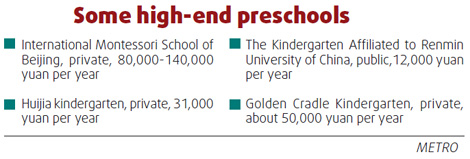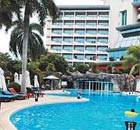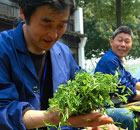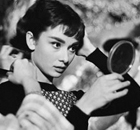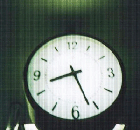Top Biz News
Kindergartens for the rich
By Wang Chao (China Daily)
Updated: 2010-02-23 11:00
 |
Large Medium Small |
|
 |
|
The International Montessori School of Beijing (MSB) employees teach students on how to recognize professions. [Courtesy of MSB] |
Competition in China literally starts at the beginning of a person's life. Parents in the city don't want their children to fall behind, so they compete to get their offspring into the best kindergartens.
The demand for early education has created a market of high-cost kindergartens in the city, which charge admission fees that are one-third higher than regular kindergartens, according to Song Jinzhi, head of the Oriental Cambridge Kindergarten in Beijing.
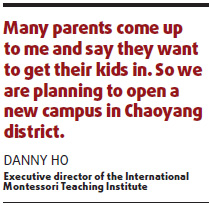
The International Montessori School of Beijing, which takes student ranging from one-and-a-half years old to 12-years old, is one of the city's most expensive.
The school charges 80,000 yuan to 150,000 yuan a year per student, depending on the student's level, said Jason Kong, the school's CEO. He said tuition fees have risen in recent years but wouldn't say by how much.
Montessori schools, which are found around the world, follow the Montessori method, a teaching approach based on research by early 20th century Italian education expert Maria Montessori.
It emphasizes initiative and encourages students to study according to their interests instead of learning through mandatory curriculums developed by teachers.
Chinese parents are not deterred by the considerable cost of international kindergartens, such as Montessori schools, according to Danny Ho, the executive director of the International Montessori Teaching Institute.
"Many parents come up to me and say they want to get their kids in," said Ho. "So we are planning to open a new campus in Chaoyang district this September, in addition to the three current campuses."
The school has almost 300 students in its three campuses. Most of the students' parents work for foreign companies or at embassies.
But Song Jinzhi, principal of the Oriental Cambridge Kindergarten, said that some Montessori schools in Beijing are overpriced.
"Some schools claim they use Montessori approaches. But they are charging money that they don't deserve," Song said.
| ||||
"Montessori kindergartens are usually more expensive than traditional ones because they have to buy special modules and train their teachers regularly," Liang said. "But that doesn't mean all the Montessori schools can live up to their names."
Among 1,266 kindergartens in Beijing, 340 are privately owned and the others are affiliated with, or subsidized by, government institutions and organizations, according to Beijing Daily.
Regular schools are also raising their fees, especially well-known public kindergartens.
Jiang Zhuoyan, a young mother in Beijing started sending her son to one of the best kindergartens in Beijing in 2005. Her son finished in 2008 and the total cost was 2,000 yuan. But now it is "10 times more expensive," Jiang said.
"Now the cost of kindergarten can easily be as much as 30,000 yuan per year," said Jiang. "Kindergartens are more expensive than colleges," a parent posting under the name 'Metallica' said on an online forum.
The rising cost is related to the baby boom between 2006 and 2008, according to Beijing Daily.
To get an auspicious birthday for babies, many parents tried to give birth in the year 2007 (the year of the Golden Pig in the Chinese Zodiac, seen as particularly lucky) and 2008 (regarded as lucky because of the Olympics), resulting in 400,000 babies being born in Beijing during 2006, 2007 and 2008. But there are currently only 230,000 spots in the city's kindergartens.
